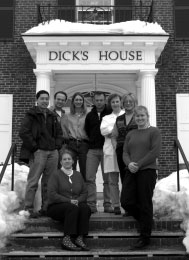A helping hand for hospitalized undergraduates
Improving patient care and enhancing medical education: Those are continuing goals of an academic medical center like DHMC. Sometimes a single, simple idea can accomplish both at once. That's the premise behind a new community service program that matches up medical students with Dartmouth undergraduates who need to be transferred from the College infirmary, Dick's House, to Dartmouth- Hitchcock.
Paul Testa, a second-year DMS student and a cofounder of the Medical Peer Advocates program, explains how it works: "We set up weekly rotations with a first- or second-year student who carries a beeper." The student with the beeper is alerted whenever a patient being transferred to DHMC wants a companion. The medical student meets the patient at the hospital and stays as long as the helping hand is needed. "The idea is to offer them some support while they're over there," says Testa.
Support: First-year medical student Anthony Perrone describes a call he went on. He says the patient had never before had a serious health problem. She "just wanted somebody else there," he says. The pace at the hospital can be "fairly slow going," he adds. "If you're there alone, it just becomes a little more ominous than it really is."
Testa mentions another way the medical students can help undergraduate patients: "It's much easier if the patient is still there when some of the xrays are being read in radiology, [but] they don't like to sit there for an hour and a half," he says. "We can sit there and interact with them . . . and facilitate the process a little bit."

|
|
Leaving the intimacy of Dick's House, the Dartmouth infirmary, for DHMC can be scary for undergraduates experiencing the health-care system on their own for the first time. But now there's help from these and other DMS students who are "medical peer advocates." Photograph by Flying Squirrel Graphics |
Charlene Bradley, the director of nursing at Dick's House, says she also advises medical students going on a call to ask questions on the patient's behalf. "I just felt horrible sending . . . an 18-, 19-year-old kid off to the Medical Center when they are feeling lousy in the first place," Bradley says. "Without there being anyone there to encourage them to ask questions . . . it can be pretty overwhelming."
College students in particular can use the support, because they're at a transition point in their relationship to the healthcare system. Most undergraduates have never interacted with a hospital or doctor on their own, and now suddenly they have to make independent decisions. Testa describes them as being "on the cusp of autonomy. . . . For the first time, they're experiencing their own autonomy as medical consumers," he says. "We can be there and let them bounce ideas off [us]."
System: The program is a special help to students who come to Dartmouth from other countries, because they may not yet be familiar with the American health-care system.
So far, the program has handled mostly trauma cases, such as sporting mishaps and knee injuries, as well as a few medical problems. Though real emergencies are diverted to the emergency room, patients in the program have had to face some serious diagnoses. And Bradley reports that they have been very happy with the service the program provides.
But the medical students who participate in the program gain something as well. "What we get out of it," says Testa, "is we can be present for the medical intercession . . . and sort of insinuate ourselves into some of the caregiving —so it becomes a learning thing for us." During the textbook- laden first two years of medical school, this gives students another chance to get into the hospital, see actual procedures and specialty consultations, and interact with caregivers. And by acting on behalf of one patient, the medical students also gain a perspective on the patient's experience amid all the activity.
Twist: "It gives you a different exposure," explains Perrone, "a different twist on your first year of medical school, rather than being chained to a desk. . . . It's one of the more rewarding things to get involved [in]."
The program is run by medical students, primarily Testa and his classmate Melissa Woo, in conjunction with Dick's House, and it is supported by the Medical School's Community Service Committee. Medical Peer Advocates is only in its second year, and the students are trying to improve their communications with Dick's House and to expand the program. Calls still come in fairly infrequently, so there is an element of luck in whether the student holding the beeper will actually get a chance to go to the hospital.
But whenever he does get to go out, Perrone takes advantage of the opportunity to watch doctors at work and observe "their positive qualities and, maybe, try to emulate those. . . . This is going to be me in five years," he concludes.
-Jonathan Weisberg
If you would like to offer any feedback about this article, we would welcome getting your comments at DartMed@Dartmouth.edu.
